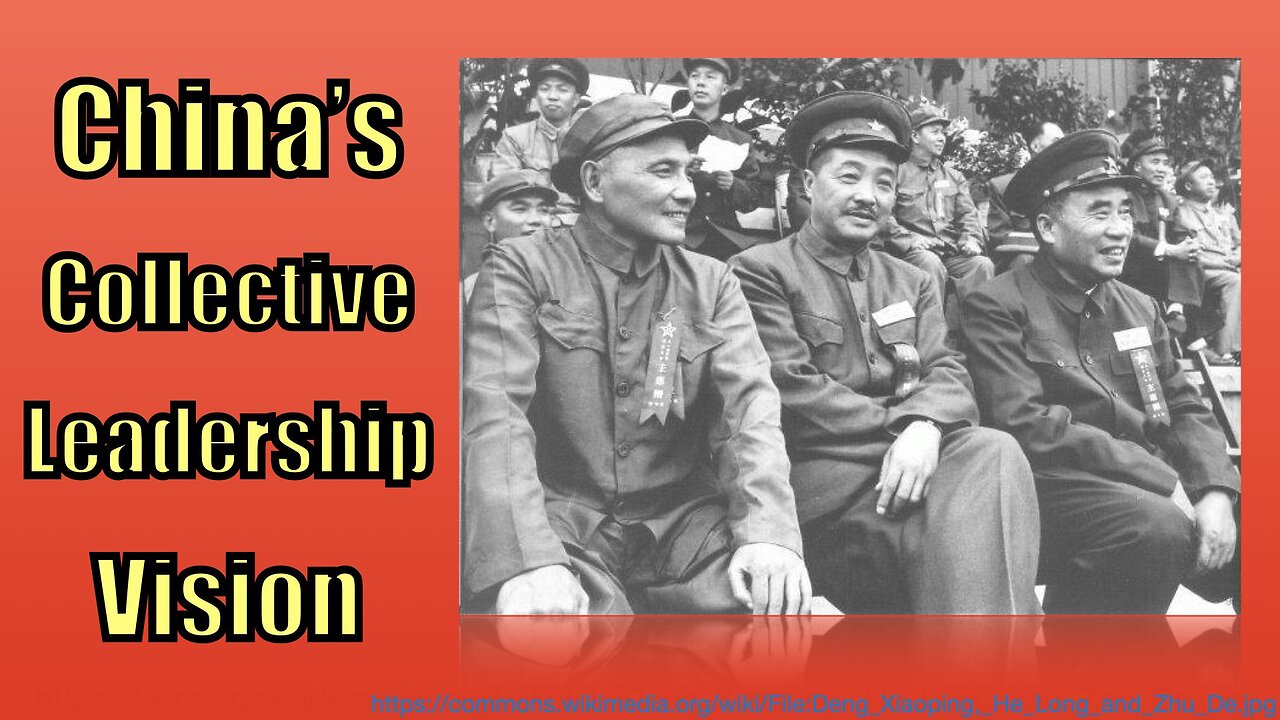Premium Only Content

China's Deng Xiaoping on Collective Leadership
Deng Xiaoping (邓小平) believed that collective leadership (集体领导) was the cornerstone of the Chinese Communist Party’s (#CCP) stability and long-term success. In this podcast, we explore 15 key statements from Deng’s speeches and writings (1938–1992), each in Chinese and English, with historical context and analysis.
Learn why #Deng warned against over-centralization of power, personal cults (个人崇拜), and policy instability — and how his principles remain relevant in China’s governance today.
Deng Xiaoping, 集体领导, collective leadership, CCP history, #Chinese politics, 邓小平文选, Deng Xiaoping speeches, democratic centralism, 民主集中制, political leadership, China governance, Chinese Communist Party, reform and opening, Chinese history podcast, CCP leadership structure, anti-personality cult, 个人崇拜
Chinese Original (with Pinyin) English Translation Volume Page (1994 edition) Context
1 “只有通过集体领导,密切联系群众,才能贯彻党的民主集中制原则,把错误减少到最低限度。”
Zhǐyǒu tōngguò jítǐ lǐngdǎo, mìqiè liánxì qúnzhòng, cáinéng guànchè dǎng de mínzhǔ-jízhōngzhì yuánzé, bǎ cuòwù jiǎnshǎo dào zuìdī xiàndù. Only through collective leadership, in close contact with the masses, can we apply the Party’s principle of democratic centralism and minimize mistakes. I ~p. 212 Report on Party Constitution revision (1956)
2 “过分集中于个人或少数人手里……损害各级党和政府的民主生活、集体领导、民主集中制、个人分工负责制。” Over-concentration of power in one person or a few harms democratic life, collective leadership, democratic centralism, and individual responsibility. II ~p. 310 On leadership reform (1980)
3 “集体领导与个人分工负责 应当结合在一起。” Collective leadership should be combined with divided responsibility for individuals. II ~p. 315 Structural reform discussions (1980)
4 “必须制度化集体领导,把它作为党内政治生活和制度建设的重要内容来抓。” Collective leadership must be institutionalized and treated as a crucial part of intra-Party politics and system building. II ~p. 338 Institutional reform (early 1980s)
5 “在党的各级机关和基层都要真正实行集体领导,改正名义集体领导实为个人说了算的错误。” At all Party levels we must truly implement collective leadership and correct the error of “nominal collective leadership” where one person actually decides everything. II ~p. 340 Emphasis on grassroots enforcement (1980s)
6 “列宁说过:‘借口集体领导而无人负责,是最危险的祸害’……急需建立严格责任制。” Lenin said: “Using collective leadership as an excuse for no one being responsible is the greatest of evils”… we urgently need strict accountability systems. II ~p. 322 Invoking Lenin to warn of diffuse responsibility
7 “过分个人集权……妨碍社会主义民主实践,妨碍党的民主集中制的实行,妨碍发挥集体智慧。” Excessive personal centralization impedes socialist democracy, implementation of democratic centralism, and utilization of collective wisdom. II ~p. 318 Critique of personalization of power
8 “我们强调集体领导,这次讲接班也是集体接班……集体领导负责重大问题。” We emphasize collective leadership; succession must also be collective… the collective handles major issues. III ~p. 42 On leadership transition (1989)
9 “我们中国共产党现在要建立起第三代的领导集体……任何一个领导集体都要有一个核心。” Our Party must now build a third-generation leadership collective… Every leadership collective must have a core. III ~p. 43 16 June 1989 talk (“Third-gen collective”)
reformdata.org
10 “一个好的领导班子……关键是要形成集体领导……要相互容忍、谦让、帮助、补充。” A good leadership team… must form collective leadership… tolerate, yield, help, and complement each other. III ~p. 44 Qualities of effective leadership collective
11 “中央领导必须有威信。改革必须在有领导、有秩序下进行。” Central leadership must have authority. Reforms must proceed under leadership and with order. III ~p. 38 Stability during reform (1988)
12 “只有坚持集体领导,才能保证政策连续性与稳定,避免把国家命运寄托在一两个人身上。” Only by upholding collective leadership can we ensure policy continuity and stability, avoiding entrusting the nation’s fate to one or two individuals. III ~p. 50 Thematic summary of Volume III crises
13 “集体领导与群众密切联系,才能避免错误、走偏路。” Collective leadership, closely linked to the masses, can prevent mistakes and deviations. II ~p. 212 Echoes the 16-word principle application
14 “一个领导集体要有核心,但核心不是个人称雄,而是集中力量办大事。” A leadership collective needs a core—but the core shouldn’t be a domineering individual; it should concentrate efforts on accomplishing big tasks. III ~p. 45 Clarifying “core” vs. “dictator”
15 “接班要制度化,坚持集体领导、民主集中、个别酝酿、会议决定的原则。” Succession should be institutionalized, adhering to the principles of collective leadership, democratic centralism, individual preparation, and decision through meetings.
III ~p. 48 Institutionalizing leadership transitions
-
 LIVE
LIVE
RealAmericasVoice
2 days agoHOME OF REAL NEWS
72,606 watching -
 LIVE
LIVE
Redacted News
1 hour agoBREAKING! CHARLIE KIRK SHOT BY ASSASSIN IN UTAH, TRUMP CALLS FOR NATIONAL PRAYERS
18,717 watching -

Right Side Broadcasting Network
6 hours agoLIVE REPLAY: Latest News from the Trump White House - 9/10/25
165K71 -
 LIVE
LIVE
The Jimmy Dore Show
40 minutes agoCharlie Kirk SHOT During Utah College Event! Rand Paul Has PROOF Fauci Lied About Deleting Emails!
4,704 watching -
 1:12:05
1:12:05
vivafrei
4 hours agoLegacy Media is the Enemy of the People! Israel Stikes Qatar, U.S., Gets Mad! AOC So Stupid & MORE!
56.6K47 -
 52:13
52:13
The Quartering
3 hours agoRace War Nears, Russia Makes Huge Mistake, Fauci Bombshell & More
88K68 -
 LIVE
LIVE
Dr Disrespect
5 hours ago🔴LIVE - DR DISRESPECT - THE FINALS - NEW SEASON 8 LAUNCH EVENT W/ THE SHOTTY BOYS
1,388 watching -
 1:44:11
1:44:11
Darkhorse Podcast
3 hours agoThe 294th Evolutionary Lens with Bret Weinstein and Heather Heying
48.5K9 -
 11:49
11:49
Dr. Nick Zyrowski
9 days ago12 Unusual NAC ( N-Acetyl Cysteine) Questions Nobody Ever Answers
83.7K10 -
 1:03:45
1:03:45
Russell Brand
4 hours agoWW3 IMMINENT! Israel & Russia Strikes Leave World “ON THE BRINK” - SF631
185K65